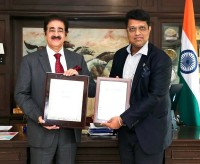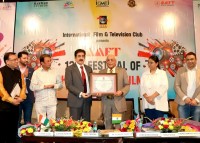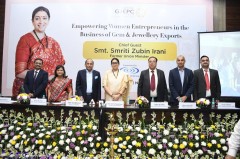- Hyatt Place Jaipur is offering exciting prices this winter season
- UK-based Private Investigators Launch Eye Witness Statement Services
- AISECT Learn introduces Skill Competency Certificate courses aimed at empowering 16 lakh youth by 2029
- FAN EXPO New Orleans Adds Seven ‘Back To The Future’ Guests For Franchise’s Largest Reunion Ever
- Women in Cloud and SHEQONOMI Empower 1 Billion Women Globally Through AI, Film, Podcasting & Leadership
- Bigul launches Execution Algos and Option Pair strategies' to optimise trading
- Sigdi chain of restaurants expands its footprint with the opening of new outlets in Anand, Gujarat, and Mira Road, Mumbai
- Kopyst Introduces Seamless Video Guide Creation: Resume and Capture Actions Without Missing a Beat!
- DataVare Launched New OFT to EML Converter to Convert Outlook OFT files to EML
- Tata CLiQ rebrands to Tata CLiQ Fashion, unveiling a vibrant new identity
- NEPCON Japan Gears Up for 2025: Spotlighting Japan’s Leadership in Global Electronics R&D and Manufacturing
- Automation Anywhere Shaping the Future of Enterprise Business Processes in India
- Bitdata Migration Launches PST Converter Tool to Simplify Data Migration for Outlook Users
- Ahlers & Ogletree's November 14th Estates & Collections Auction in Atlanta Featured 385 Lots
- Cena Pranzo has been named one of Delhi NCR's Top 5 Restaurants by Hospitality Horizon
 Mail to a Friend Mail to a Friend |
|
     |
31% of employees in India experienced ageism at work, reveals Randstad India's Study
3rd June 2024: Randstad India, a leading talent company has launched an exclusive study on 'Ageism in the Workplace'. The study was launched at an event in Bengaluru on 31st May in the presence of Bindu Venkatesh, Head HR, ColorToken Inc., Aparna Sardar, Country Head - Human Resources (India), 3M, Gurucharan Singh Gandhi Head HR, Madura Fashion and Lifestyle, Aditya Birla Fashion and Retail, Aravind Warrier, HR Leader - People Partner & Culture | Digital & IT, Volvo India, Aarti Raote, Partner, Deloitte India, and keynote speaker, Meena Ganesh, Chairperson and Co-founder of Portea Medical.
This unique ED&I-focused study that covered almost 1000 respondents revealed that 40% of the surveyed workforce have either experienced or witnessed ageism at work. This sheds light on a pervasive issue that is often overlooked in the workplace. It is interesting to note that although people have experienced the phenomenon, they lacked an awareness of the term ‘ageism’ itself, in its truest sense.
The data suggested that younger age groups faced more age discrimination than older age groups. There was a general lack of trust in the youngest age group’s abilities and skills while the oldest age group experienced the privilege of age-based and seniority-based respect. Surprisingly, 42% of women reported experiencing or witnessing ageism, compared to 37% of men, clearly a reflection of how ageism at work intersects with other dimensions of diversity.
Notably, employees from multinational corporations (MNCs) headquartered in India reported higher instances of ageism, with 41% affirming they faced age-related biases. On the other hand, of respondents from MNCs headquartered outside of India, 29% agreed there was age-related bias in their workplace and 30% of respondents agreed they found it challenging to work with people from different age groups (compared to 56% of respondents at MNCs with HQ in India).
The impact of ageism extends to workplace inclusion, with 80% of all respondents feeling they can be their authentic selves at work, but younger employees (under 35) report a lower sense of inclusion (73%) compared to their older counterparts (87%). Additionally, the study highlights the unique challenges faced by different demographic groups, such as those with caring responsibilities, physical or mental impairments, and diverse sexual orientations, who report higher incidences of ageism.
Speaking on “Ageism in the workplaceâ€, Viswanath PS, MD & CEO, Randstad India said, “Ageism is one of the most overlooked unconscious biases made at the workplace across levels. Overcoming ageism requires a conscious effort to recognize and challenge stereotypes to create an environment where experience and fresh perspectives are equally valued. By fostering an inclusive culture that embraces employees of all ages, organizations can harness the full potential of their workforce, driving collaboration, innovation, and growth. It is essential that we recognize the unique contributions that individuals of all age groups bring to the table and work actively to integrate their experiences into the fabric of our companies.
Promotions and compensation should be determined by performance, expertise, and potential, not by arbitrary age brackets. By breaking free from age-based biases, we can create a fairer, more equitable environment. And, building a truly inclusive workplace goes beyond policy-making especially when it comes to dealing with behavioral biases. Leaders must set the tone by exemplifying inclusive behavior, promoting intergenerational collaboration, and ensuring that age-related biases are systematically dismantled. When organizations commit to such principles, they pave the way for sustainable success and resilience in a rapidly evolving business landscape.â€
Commenting on the importance of building an intergenerational workforce, Meena Ganesh, Chairperson and Co-founder of Portea Medical said, “It is important to recognize that having teams that bring different kinds of capabilities and energies into the system is very crucial. Businesses often cater to customers from different age brackets. Hence, unless they have teams that mirror these customer segments, they will miss out on crucial consumer insights. So, building a truly intergenerational workforce by combining forces from all age groups is absolutely critical.
Today, a lot of skilling and training programs tend to focus on younger employees. However, it is equally important to develop such programs for the older generation to expose them to new ways of working and changes in technology and business. This can make a huge difference in how organizations perform. Let's together ensure that capable people do not retire from the workforce due to age-related biases.â€
Some key findings:
Respondents from MNCs headquartered in India face unique challenges
41% of respondents from MNCs headquartered in India experienced age-related stereotypes, compared to 28% from other organization types.
57% of respondents from MNCs headquartered in India considering leaving their roles cited ageism as a contributing factor, compared to 38% from other organization types.
45% of respondents from MNCs headquartered in India feel that age is a factor in employee layoffs, compared to 27% from other organization types.
Workplace Inclusion and Compensation
27% of all respondents feel they are not fairly compensated due to their age. The issue is more pronounced among younger employees, with 32% of those aged under 35 years feeling unfairly compensated.
57% of respondents believe their contribution is valued because of their age. This is 51% for those aged under 35 years and 63% for those aged 35 and above.
80% feel they can be their authentic selves at work, although this drops to 73% for those aged under 35 years
Age-Related Assumptions and Biases
24% of respondents aged 55 years and above feel they are perceived as less competent with technology due to their age.
16% of those aged under 35 feel they are seen as less reliable and responsible.
29% of younger respondents (under 35) feel they are perceived as less capable of leadership roles.
About randstad india:
Randstad India is a leading talent company providing services across four key specializations - operational talent solutions, professional talent solutions, digital talent solutions, and enterprise talent solutions. The organization is committed to providing equitable opportunities to people from all backgrounds and helping them remain relevant in the rapidly changing world of work. Randstad India has a deep understanding of the labour market to help clients create high-quality, diverse, and agile workforces they need to succeed. In the process, the organization helps talent secure meaningful roles, develop relevant skills, and find purpose and belonging in their workplace.
Randstad India has been a leading player in the industry for more than 30 years and continues to deliver innovative and specialized talent solutions to clients across sectors. Randstad is a global talent leader with the vision to be the world’s most equitable and specialized talent company, active in 39 markets across the globe.
Company :-Adfactors PR
User :- Tanima Das
Email :-tanima.das@adfactorspr.com




_thumb.jpg)






